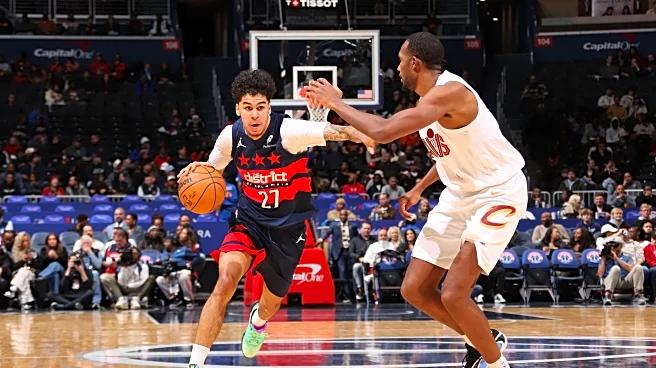What's Happening?
National Tight Ends Day, an unofficial holiday celebrated on the fourth Sunday of October, highlights the contributions of tight ends in the NFL. This year, several players delivered impressive performances. Packers tight end Kraft led the celebrations
with seven receptions for 143 yards and two touchdowns during Sunday Night Football. Eagles tight end Goedert also made a significant impact, scoring two touchdowns in Philadelphia's victory over the Giants. Despite a loss to the Texans, 49ers veteran George Kittle recorded four receptions for 43 yards and a touchdown. Rookies Taylor and Harold Fannin Jr. marked their first National Tight Ends Day with notable performances, contributing to their teams' efforts with touchdowns and key receptions.
Why It's Important?
National Tight Ends Day brings attention to a position often overshadowed by more prominent roles in football. Celebrating tight ends highlights their versatility and importance in both offensive and defensive plays. The performances on this day can boost players' profiles and morale, potentially influencing team strategies and player selections. For rookies like Taylor and Fannin Jr., standout performances can accelerate their career development and increase their visibility in the league. The day also fosters camaraderie among players and fans, enhancing the community aspect of the sport.
What's Next?
As the NFL season progresses, the performances on National Tight Ends Day may influence team dynamics and player utilization. Coaches might adjust strategies to leverage the skills of tight ends more effectively, especially those who demonstrated exceptional abilities. The recognition from this day could lead to increased media attention and fan support for these players, impacting their career trajectories. Teams may also consider the potential of rookie tight ends in future games, given their promising performances.
Beyond the Headlines
The celebration of National Tight Ends Day underscores the evolving nature of football, where positions traditionally seen as secondary are gaining recognition. This shift reflects broader changes in sports culture, where diversity in roles and skills is increasingly valued. The day also highlights the importance of community and tradition in sports, fostering a sense of belonging and shared identity among players and fans. As the NFL continues to evolve, such celebrations may become more common, promoting inclusivity and appreciation for all positions.

















